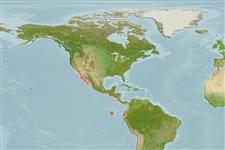>
Clupeiformes (Herrings) >
Dorosomatidae (Gizzard shads and sardinellas)
Etymology: Opisthonema: Greek, opisthe = behind + Greek,nema = filament (Ref. 45335).
Issue
Date & author Eschmeyer, pers. comm.
Environment: milieu / climate zone / depth range / distribution range
Οικολογία
Θαλασσινό(ά); εύρος βάθους 0 - 50 m (Ref. 188). Subtropical; 36°N - 6°S, 123°W - 77°W (Ref. 188)
Eastern Pacific: Los Angeles, California to Sechura Bay, Peru. (Included in at least some accounts of Opisthonema bulleri and especially Opisthonema libertate which used to be the only Pacific species recognized).
Μέγεθος / Βάρος / Age
Maturity: Lm ? range ? - ? cm
Max length : 30.0 cm TL αρσενικό/απροσδιόριστο; (Ref. 55763); common length : 20.0 cm SL αρσενικό/απροσδιόριστο; (Ref. 9291)
Short description
Κλείδες προσδιορισμού | Μορφολογία | Μορφομετρία
Ραχιαίες άκανθες (συνολικά) : 0; Μαλακές ραχιαίες ακτίνες (συνολικά) : 13 - 21; Εδρικές άκανθες: 0; Μαλακές εδρικές ακτίνες: 12 - 23. Body moderately deep and compressed; posterior edge of gill openings with two clearly visible, fleshy, protuberances; gill rakers numerous, 41 to 69 on ceratobranchial (in fish longer than 14 cm total length); last dorsal ray elongated and filamentous; back gray-green with silver-white flanks and a black spot behind the gill slit followed by a yellow lateral strip (Ref. 55763). The filamentous last dorsal fin ray distinguishes it from members of any other eastern Pacific clupeoid genus. Separated from other eastern Pacific Opisthonema by having 41 to 69 lower gill rakers in fishes over 14 cm standard length.
Usually found near shore, forming schools. Feeds on crustaceans and pteropods.
Life cycle and mating behavior
Γεννητική Ωρίμανση | Αναπαραγωγή | Γεννοβολία | Αβγά | Γονιμότητα | Προνύμφες
Whitehead, P.J.P., 1985. FAO Species Catalogue. Vol. 7. Clupeoid fishes of the world (suborder Clupeoidei). An annotated and illustrated catalogue of the herrings, sardines, pilchards, sprats, shads, anchovies and wolf-herrings. FAO Fish. Synop. 125(7/1):1-303. Rome: FAO. (Ref. 188)
IUCN Red List Status (Ref. 130435: Version 2024-1)
Threat to humans
Harmless
Human uses
αλιεία: περιορισμένης εμπορικότητας; δόλωμα: occasionally
Εργαλεία
Special reports
Download XML
Διαδικτυακές πηγές
Estimates based on models
Preferred temperature (Ref.
123201): 20.5 - 28.4, mean 25.4 °C (based on 72 cells).
Phylogenetic diversity index (Ref.
82804): PD
50 = 0.5312 [Uniqueness, from 0.5 = low to 2.0 = high].
Bayesian length-weight: a=0.00794 (0.00454 - 0.01390), b=3.05 (2.90 - 3.20), in cm total length, based on LWR estimates for this species & (Sub)family-body (Ref.
93245).
Τροφικό Επίπεδο (Ref.
69278): 3.3 ±0.38 se; based on food items.
Ελαστικότητα (Ref.
120179): Υψηλό, ελάχιστος χρόνος για διπλασιασμό πληθυσμού < 15 μήνες (Preliminary K or Fecundity.).
Fishing Vulnerability (Ref.
59153): Low vulnerability (20 of 100).
